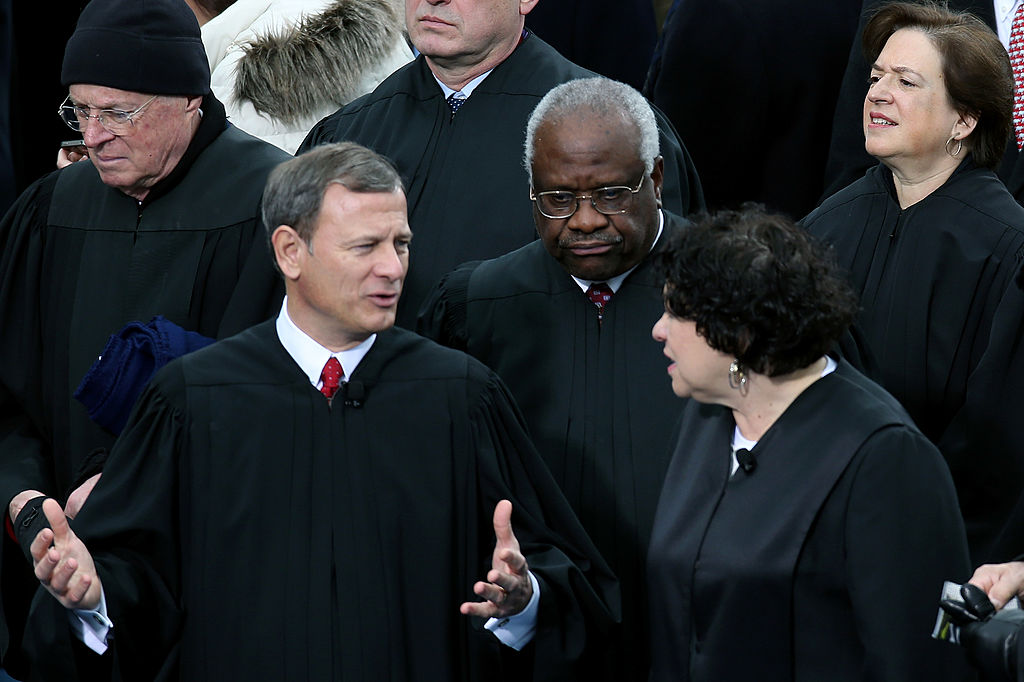
WASHINGTON, DC – JANUARY 21: (L-R) Supreme Court Chief Justice John Roberts, Justice Clarence Thomas and Justice Sonia Sotomayor attend the public ceremonial inauguration for U.S. President Barack Obama on the West Front of the U.S. Capitol January 21, 2013 in Washington, DC. Barack Obama was re-elected for a second term as President of the United States. (Photo by John Moore/Getty Images)
Hopes and fears of different groups were stoked on June 21 as the Supreme Court released its opinion in Carson vs. Makin, a school funding case out of Maine. While not exactly gun control or abortion, which the Court did not address, this case does offer much fodder for the culture wars. For conservatives, the case is a win for civil rights, vindicating religious families and schools. For the left, it represents an important loss for the separation of church and state, as well as a harbinger of more to come.
Where America’s Day Begins
Maine will now be forced to stop its discrimination against religious schools in its payment plans. The Supreme Court ruled 6-3 that the state was infringing the First Amendment rights of Mainers by restricting school payments to only “nonsectarian” schools. Chief Justice John Roberts wrote the opinion of the Court, and he was joined by Justices Clarence Thomas, Samuel Alito, Neil Gorsuch, Brett Kavanaugh, and Amy Coney Barrett. Justice Stephen Breyer dissented, joined by Justices Elena Kagan and Sonia Sotomayor, who also wrote in dissent.
Maine gives tuition assistance to parents of rural families who don’t live in school districts with high schools. If the district doesn’t operate a secondary school and has no agreement with a neighboring district, the state will pay for tuition to a private school. Maine families’ vouchers to pay for private schooling can be used at almost any type of school, almost anywhere, including schools in foreign countries. But not religious ones, since 1981, when the state changed the law, imposing a new requirement that any school receiving payments must be “[a] nonsectarian school in accordance with the First Amendment of the United States Constitution.”
Battle of the Constitutional Clauses
The case represents a battle within the First Amendment. Does the Establishment Clause require Maine to restrict payments to religious schools, or does the Free Exercise Clause mandate the opposite and require Maine to pay for schools regardless of religious expression?
Roberts’ majority opinion said:
“Maine has decided not to operate schools of its own, but instead to offer tuition assistance that parents may direct to the public or private schools of their choice. Maine’s administration of that benefit is subject to the free exercise principles governing any such public benefit program — including the prohibition on denying the benefit based on a recipient’s religious exercise.”

Breyer’s dissent said: “The Court today pays almost no attention to the words in the first Clause while giving almost exclusive attention to the words in the second.” Sotomayor wrote: “[W]hile purporting to protect against discrimination of one kind, the Court requires Maine to fund what many of its citizens believe to be discrimination of other kinds.” That is the liberal position in a nutshell.
Sotomayor concluded her dissent with some barbs directed at her colleagues. “What a difference five years makes. In 2017, I feared that the Court was ‘lead[ing] us … to a place where separation of church and state is a constitutional slogan, not a constitutional commitment.’ Today, the Court leads us to a place where separation of church and state becomes a constitutional violation.” She concluded: “With growing concern for where this Court will lead us next, I respectfully dissent.”
Roberts finished his arguments by saying, “Regardless of how the benefit and restriction are described, the program operates to identify and exclude otherwise eligible schools on the basis of their religious exercise.” The Court meets again on June 23 to issue more rulings.
Remember to check out the web’s best conservative news aggregator
Whatfinger.com — the #1 Alternative to the Drudge

